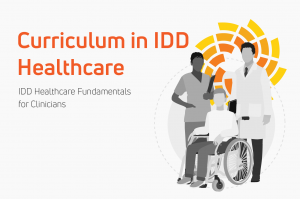Online Training for MDs Helps Delivering Better Healthcare to People with IDD
A new survey reveals nurses may experience difficulties with MDs to provide appropriate healthcare for people with IDD. The findings of the study have been published in EC Nursing and Healthcare in February of 2021.
A survey of 714 MDs shows only 40% of physicians were “very confident” about their ability to provide the same quality of care to patients with IDD. Of this population, 56% “strongly agreed” that they welcomed people with a disability into their practice. The study published early this year also shows 82% of the MDs surveyed believe that people with a significant disability have a worse quality of life than those without a disability.
Nurses react: people with IDD are a challenge to doctors
Yet, the study also surveyed nurses working with physicians on patients with IDD. They reported on the challenge it is for them to find clinicians who understand the needs of this population of patients. Amount the comments collected by the study:
“During a consultation with an ER physician, the doctor stated that people like my patient aren’t meant to live that long and have no quality of life.”
“They don’t listen to the nurse or direct support provider that knows the client.”
“Physician uncomfortable with treating individuals with IDD. Appeared either scared or annoyed.”
“I’ve had a number of physicians, instead of treating our individuals, recommend hospice because of a ‘poor quality of life.’”
“I had a doctor totally ignore what I was saying and started the individual on psych meds.”
It seems that med schools have to do a better job at educating their students about providing healthcare for people with disabilities.
Dr. Escudé, who conducted the nursing survey, noted: “It’s more than just learning about how to treat medical conditions commonly seen in people with IDD like aspiration pneumonia and bowel obstruction. Physicians should be taught about the support structure for people with IDD, how to facilitate better communication and, most importantly, about the often-missed direct relationship of various adverse behaviors to treatable, underlying medical causes.”
Online training for better healthcare for people with IDD?
“Online learning programs make it easy to learn from experts in various fields without having to hire new school teaching staff or attend live lectures,” explains Dr. Escudé.
Online training has indeed taken a new role in the delivery of continuous education during the pandemic. Studies have shown that online training enables participants to retain information better, and that the availability of study materials after completion of the training was of great help to participants needing a refresher in the course of their occupational duties.
Leaning Management systems have also made the delivery of continuous education courses easier and more flexible. For the healthcare industry in general, eLearning has proven to be less costly and more convenient than traditional classroom instruction. Remote video platforms bring the education at the participants’ location, on their own schedule.
A new online curriculum for IDD Healthcare
Intellectability, an organization specialized in providing educational pathways to healthcare professionals and individuals in charge of caring for the living conditions of persons with IDD, has come out this year with a brand-new online program to train clinicians and med school students in the fundamentals of IDD heathcare.

A pilot study has been conducted among medical students who completed the curriculum, and shows that 94% of the participants “strongly agreed” that it provided information they did not have in the field of IDD healthcare, and 81% “strongly agreed” they felt more confident in being able to treat people with IDD.
The Curriculum in IDD Healthcare has already been adopted by Station MD, a company specializing in IDD telemedicine, to train their physicians.
Intellectability states the new online training is both for individual physicians, and for agencies and health professional schools to teach the fundamentals of IDD healthcare to community physicians and med school students.